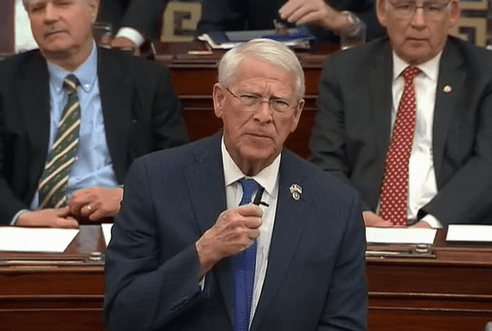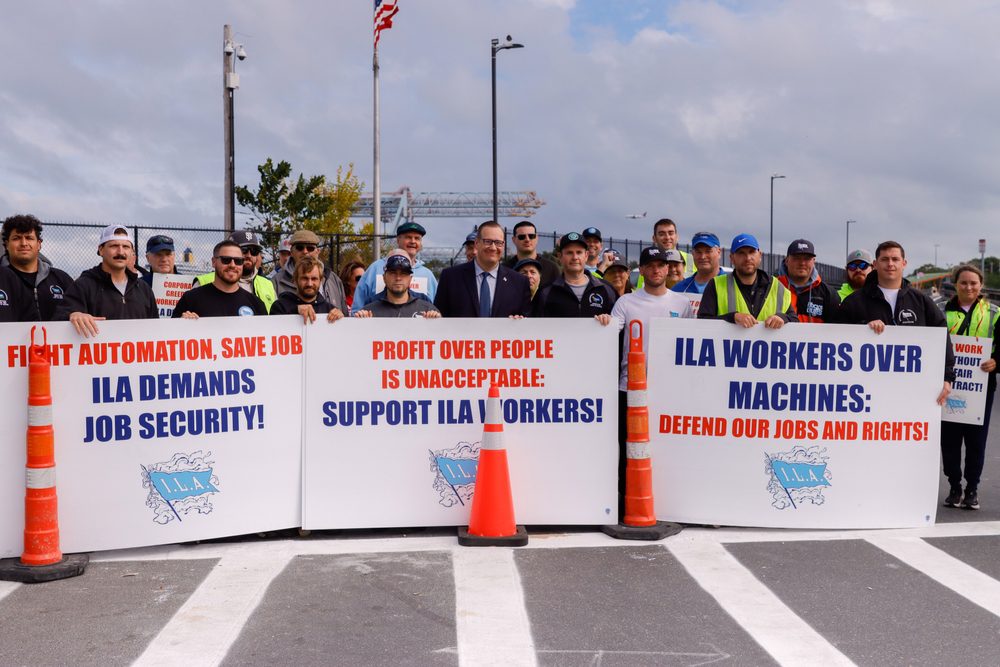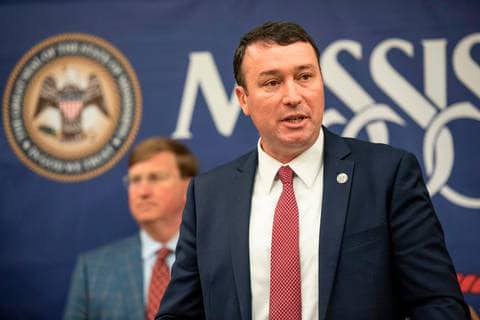
U.S. Senator Roger Wicker poses a parliamentary inquiry during the impeachment trial of Secretary Alejandro Mayorkas on Wednesday, April 17, 2024. (Photo from CSPAN)
Magnolia Tribune sat down with U.S. Senator Roger Wicker this week, in a wide-ranging, no holds barred interview on the challenges facing America – from the border crisis to America’s role in foreign conflicts to the recent port strike.
On the Crisis at the American Southern Border
Americans are concerned about the nation’s immigration policy. The issue consistently ranks in the top three of importance in national polls.
Sen. Wicker told Magnolia Tribune that recent reports shed a concerning light on the spike in illegal immigration over the past few years. Those reports, according to Wicker, show that some of the people entering the United States illegal have “sketchy backgrounds.”
“They are either terrorist threats, safety threats, or they were in criminal activity before they came over here,” he said.
Wicker believes the spike in illegal immigration experienced in recent years is a byproduct of both failing to enforce existing laws and changes in policy between the Trump and Biden administration.

He says that during his most recent visit to the border, agents told him “if the administration would let us simply go back to enforcing the law as it is on the books right now, we’d be a lot better off.”
When asked about changes in policy between the last two administrations, Wicker said President Biden’s early decision to suspend former President Trump’s “Remain in Mexico” policy had a negative impact.
Under the Trump administration, the White House negotiated with the Mexican government to release migrants seeking asylum in the U.S. into Mexico pending a decision on their asylum petitions. In February of 2021, the Biden administration suspended the policy, allowing asylum seekers to enter the U.S. pending adjudication of their petitions and setting off a series of legal challenges.
Wicker says “Remain in Mexico” was a “major achievement by the Trump administration,” and questioned “why on earth” the Biden administration would have abandoned it. “It makes absolutely no sense at all. It was an achievement, a diplomatic achievement with our southern neighbor.”
When pressed on public criticism that Republicans in the U.S. Senate had killed a border security bill this year to keep the issue alive for the election cycle, Sen. Wicker said the bill might have made some marginal impact, but left a lot to be desired.
“Maybe it would have helped. I think it had further to go than some people, some of the commentators think. It wasn’t about to be signed into law. There were still some things that had to be worked out and it had to be brought to the floor,” he said.
“But I would go back to this truth, and it’s what I learned when I went to the border the last time, let the border people do what they want to do under the current law.”
On America’s Role in Foreign Conflicts
Senator Wicker serves as the Ranking Member of the Committee on Armed Services in the U.S. Senate and is an outspoken proponent of the Reagan-era foreign policy concept of “peace through strength.”
There is, however, a growing contingent of people on the ideological right that have adopted a more isolationist viewpoint, voicing opposition to American entanglement in ongoing conflicts in both the Middle East and Ukraine.
Mississippi’s senior Senator believes the world is facing a unique threat and that the United States cannot afford to stick its head in the sand.
“The reason every expert says we are in the most serious national security situation we’ve had really since World War II is that this axis of aggressors is working together like they’ve never worked before,” said Wicker.
He points to deepening ties between China, Russia, North Korea and Iran.

Since Hamas attacked Israel last October 7th, Israel has gone on the offensive, not only in Hamas-controlled Gaza, but with attacks in Lebanon and Iran. The Iranian government launched missiles into Israel just this week.
Questioned about how the U.S. could help to de-escalate growing tensions in the Middle East, Sen. Wicker rejected the premise. “I’m not really advocating de-escalation. I’m advocating victory,” he said.
Wicker argued, “Iran still is not strong enough to win a regional war. And so, what they have hoped to do is fund their three proxy groups, the Houthis, Hamas, and Hezbollah, and have them do the terrorist attacks.”
He says October 7th was a “turning point” and that he “absolutely applauds” Israeli Prime Minister Benjamin Netanyahu.
“I applaud him for saying if we want to survive as a country and frankly as the only democratically elected government that whole area, then we’re going to have to take out these three groups whose only sworn goal is the elimination of the Jewish state from the Middle East.”

Asked about a line of argument that America should focus its resources domestically instead of intervening in global conflicts – an argument that has seen new light in the wake Hurricane Helene – Wicker again rejected the premise as a “false choice.”
“We can walk and chew bubble gum at the same time. And clearly, we made a promise to Ukraine. Our country put its credibility on the line. And we said, if you will give up nuclear weapons, we’ll be your friend and we’ll have your back,” he said.
“Now, at the point we quit keeping our word to people on an issue that seriously, then we’ve really damaged ourselves. So, we can keep our promises to our friends, and we can keep our alliances in Europe, which really has kept the world at peace since World War II. It’s been a remarkable achievement. We can do that and still take care of Americans.” Wicker continued, “We can guard our border and still be part of an alliance with Britain, Australia, and South Korea. So, I’m rejecting those false choices. We make these decisions because we want America and Americans to be safe.”
On the Port Strike
No sooner had a strike at American ports along the East Coast and the Gulf of Mexico began this past week than the International Longshoremen Association (ILA) announced a potential resolution and a resumption of work. In Magnolia Tribune’s conversation with Senator Wicker, he pointed out that the announcement technically marked a delay in the strike until January, or after the forthcoming election.
Wicker serves as a Senior Member of the Commerce and Transportation Committee in the U.S. Senate, and was previously Chairman of the committee prior to Democrats gaining a majority of the chamber.
He voiced concern both over the unfairness of the demands being made the longshoremen’s union and the administration’s response to a threat, which ILA President Harold Daggett admitted would cripple the U.S. economy.
Wicker said the union was seeking an 11-12 percent increase in pay annually over a six-year period.
“I think most of us who work for somebody else and hope for a cost of living increase every so often, they think 11-12 percent increase in pay per year, guaranteed for more than half a decade, is pretty excessive,” said Wicker.

He also balked at union demands meant to end mechanization at our nation’s ports. He says that while mechanization might take away certain jobs, “it creates other jobs.” He argued if we are to do away with technologies that make our ports more efficient, we might as well “go back to picks and shovels to build our interstate system.”
“I certainly hope when that [the strike threat] is finally resolved, we will agree that this country can enter the second, third and fourth quarters of the 21st century by being as modern as possible.”
On the question of the administration’s response, Wicker notes that “the Taft-Hartley Act gives the president, in cases of national security, which absolutely is threatened by our ports being shut down, the right to order people back to work.” But he says, “President Biden made it clear from the very start he would never, as the strongest union man ever, impose such a thing.”
Wicker also noted that the Taft-Hartley Act gave birth to “right to work” laws, which allow workers to choose whether or not to join a union or pay union dues. He says those laws make places like Mississippi more attractive to industries looking to build.
In recent years, some within Wicker’s own party, such as Missouri Senator Josh Hawley, have bucked conservative orthodoxy to push back against right to work and in favor of unions.
On Hurricane Helene
Senator Wicker expressed disappointment in the current response to the destruction caused by Hurricane Helene in North Carolina, Georgia and East Tennessee.
“What I’m seeing on television is what Americans are seeing, but it seems that it’s a terrible disaster there and something that was clearly not expected and never anticipated, that those mountainous areas would suffer from a hurricane. But it does seem that this administration was unprepared for that sort of thing,” Wicker said.
He continued, “And they need to get their act together, need to get it together soon. I mean, not only we’ve got to get these kids back to school, we’ve got to get hospitals back open. The electric grid in those two states has got to be fixed and fixed quick. And also we’ve got a presidential election involving three significant states there and they’ve got to get the precincts back in order.”
North Carolina and Georgia are among a handful of “battleground states” expected to be pivotal in deciding the 2024 presidential contest.









